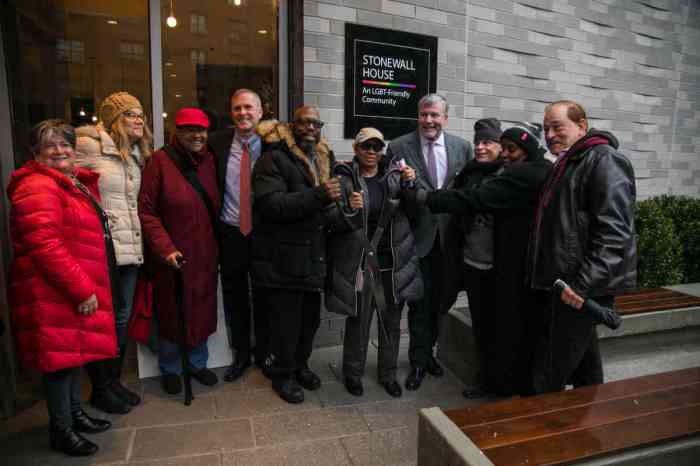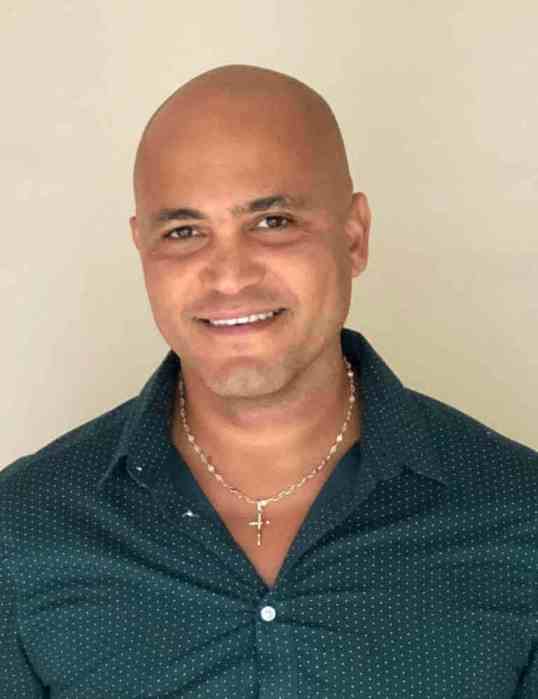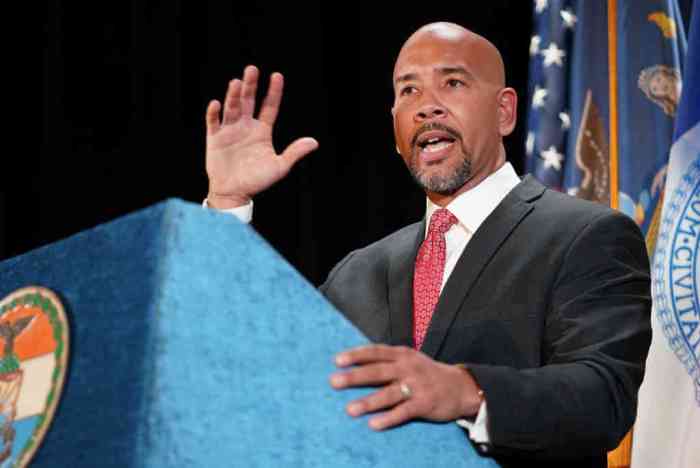ILLUSTRATION BY MICHAEL SHIREY
Drawing on the active participation of other LGBT and civil rights advocates, non-profits engaged in housing development and financing, and a top representative of the federal Department of Housing and Urban Development (HUD), Services and Advocacy for GLBT Elders (SAGE) has announced a bold plan to remake the housing opportunities and climate for older queer Americans across the nation.
In a panel discussion of experts with the breadth of skills and mission to have a systemic impact, SAGE’s executive director, Michael Adams, laid out a new National LGBT Elder Housing Initiative to build new housing, improve access to and services available in existing units, and educate seniors about their rights. The February 3 panel, held in SAGE’s Chelsea headquarters, came just one week before the White House convenes a special conference on the housing needs facing older LGBT Americans.
One dramatic headline to come out of this week’s panel is that SAGE is working with HELP USA, a non-profit housing advocacy and development organization founded by Governor Andrew Cuomo almost three decades ago, to construct an LGBT-friendly senior housing project in the Bronx. Adams emphasized that with financing not yet in place, it would be inappropriate to go into a lot of detail about the plan, but he did acknowledge the support the effort is getting from both Mayor Bill de Blasio and the City Council. Adams praised the mayor for including a focus on LGBT senior housing needs when he laid out his vision for the city’s affordable housing efforts last May.
Michael Adams, executive director of SAGE. | MICHAEL SHIREY
David Cleghorn, HELP USA’s senior vice president for real estate development, elaborated on the project’s underlying financing approach — relying on the federal government’s low income tax credit program, which developers gain access to through allocations made to local governments. A mixture of loans and grants, both governmental and private, would fill out the financing package. Projects like the one contemplated for the Bronx — and already up and running in Philadelphia, Chicago, Minneapolis, and Los Angeles — are intended as affordable housing and eligibility is based on income criteria.
Adams and those joining him on the panel emphasized that the community cannot build its way out of what is now a shortage of appropriate housing for LGBT seniors. The Bronx project is just one part — a very small part — of the overall solution required. The vast majority of seniors will access more conventional housing options, and SAGE’s goal is to ensure that those options are hospitable to them. And whether LGBT elders seek out senior housing options or instead choose to age in place where they are already living, the group is also committing to improve their access to culturally competent social and health services.
Data presented at the panel indicate that the community is a long way from realizing these goals. A recent SAGE poll of nearly 3,000 LGBT Americans 45 and older found significant anxiety about financial security in retirement, about facing discrimination in senior housing options, and about engaging in volunteer work if their sexual orientation or gender identity is known. LGBT elders are more likely than their straight peers to live alone and have small support networks. And income disparities between LGBT elders and the population generally are particularly pronounced for lesbians and those who are transgender.
The SAGE survey also uncovered interest in LGBT-friendly housing options, due in part to discrimination already experienced. One in eight surveyed — and one in four among transgender respondents — said they had encountered discrimination when searching for housing.
USE PAUL sage edie.jpg Edie Windsor, who won her challenge to the Defense of Marriage Act at the Supreme Court and has been active in supporting SAGE for decades, offered introductory remarks at the panel. | MICHAEL SHIREY
An investigation by the Equal Rights Center, however, suggested that discrimination facing senior same-sex couples may be more pronounced than that found in the SAGE survey. The group, which is partnered with SAGE in its new initiative, sent 200 pairs of couples — one same-sex, one different-sex — to inquire about rental availability in senior housing developments in 10 different states. In 96 instances — 48 percent — the same-sex couple experienced at least one type of discrimination. The same-sex couples were misled about what was available, faced more onerous or expensive application requirements, or were not told of rental incentives and amenities they qualified for.
With many LGBT people facing a future in which they’re likely to seek out senior housing options in the communities where they live, changing that that picture is “desperately needed,” Adams said. The most obvious route is through changing government policies. Participation in the SAGE event by Jennifer Ho, a senior advisor for housing and services at HUD, underscored the fact that sexual orientation and gender identity are protected categories in the nondiscrimination requirements for all federally-funded projects.
The same protections are absent in much of the country. Adams talked about the lack of comprehensive nondiscrimination legislation at the federal level, and SAGE has joined a broad-based coalition pushing for such a bill in Congress, an effort that the Human Rights Campaign, the community’s lead lobbyist on Capitol Hill, is now supporting for the first time. The effort is unlikely to be successful in the current Republican-controlled Congress, but at least it stakes out a more aggressive goal for the community.
A majority of states, many of them currently controlled as well by the GOP, also lack comprehensive civil rights protections based on sexual orientation and gender identity, though some local governments in many of those states do have nondiscrimination ordinances.
Where protections do occur, SAGE and the Equal Rights Center emphasized the need to press officials to enforce bans on housing discrimination or to reach out to policy makers to enhance enforcement provisions. Informing seniors about their rights — and most importantly, how to exercise those rights — is a crucial part of effective enforcement, and SAGE is focused on that as well. Sherrill Wayland, the executive director of SAGE Metro St. Louis, talked about the work her group does to educate seniors about the varying degrees of protection they enjoy in the city and the many dozens of surrounding suburbs.
Melissa Rothstein, deputy director of the Equal Rights Center, Cheryl Gladstone, senior housing program director at Enterprise Community Partners, and Sherrill Wayland, executive director of SAGE Metro St. Louis. | MICHAEL SHIREY
Beyond nondiscrimination protections, government is also a player in providing financing for housing, and Cheryl Gladstone, the program director for senior housing at Enterprise Community Partners, a non-profit that specializes in financing for affordable housing, policy analysis, and the training of housing providers in a variety of areas, emphasized the need to protect those federal programs that can be used to increase the stock of senior housing and could be repurposed to provide a broader range of social services as well. Senior housing experts increasingly talk about the value of using housing as the core around which to build better access to social and health services.
HELP USA’s Cleghorn talked about the way in which federal financing programs were adapted to the goal of eliminating homelessness among veterans, an effort he described as “successful.” Developing the political will to create financial incentives for LGBT senior housing is obviously a taller order, but if mainstream options can be made more welcoming to LGBT elders then focusing on expanding the overall senior sector could have significant impact on the community’s well-being.
Which brought the panel discussion around to the other key piece in the initiative — training housing providers.
“We’re never going to build enough LGBT-specific housing — we need to do cultural competency training for housing providers and caregivers,” said Enterprise Community Partners’ Gladstone.
Wayland, whose group provides such trainings at senior housing developments in St. Louis, said staff are typically very responsive — and say they’ve never before been exposed to information about the needs and concerns of LGBT elders.
In launching a nationwide training program, SAGE is starting with pilot programs run by Enterprise Community Partners in senior facilities in Washington, DC, and Kansas City managed by the National Hispanic Council on Aging.
The optimistic future SAGE envisions with its new housing initiative involves a small dose of projects tailored specifically to LGBT elders, effective legal protections for the community in housing everywhere, housing providers sensitive and responsive to the special needs of older queer residents, and the ready availability of the services and amenities that everyone needs to be safe, healthy, and engaged in life during their senior years.
“We are not building buildings,” Adams said, in closing out the panel’s discussion. “We are building communities.”






































